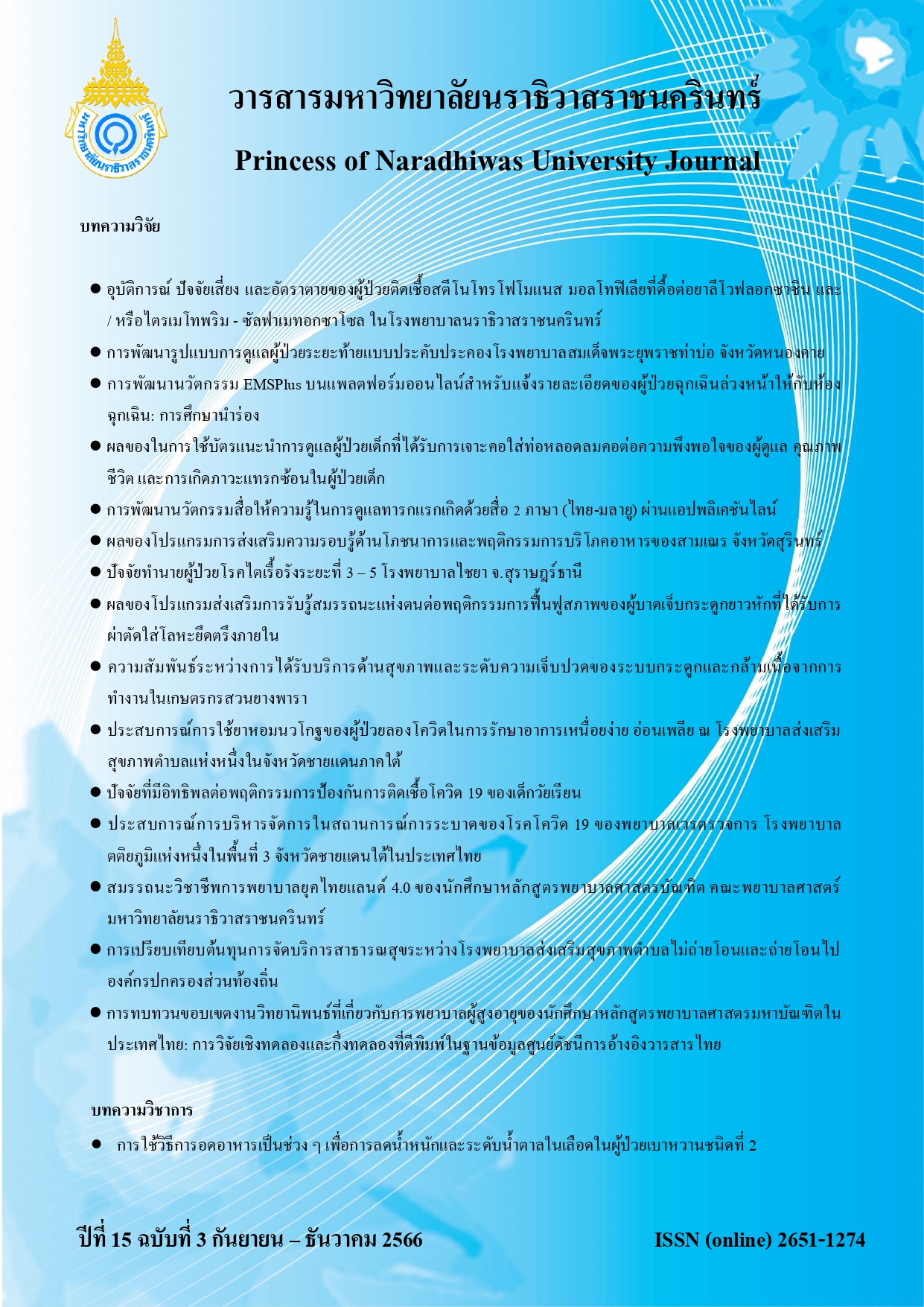Effects of Nutrition Literacy Promotion Program on nutrition literacy and food consumption behaviour of Novices, Surin Province
Keywords:
Nutrition literacy promotion program, Nutrition literacy, Food consumption behaviourAbstract
The objective of the pre- and post-test quasi-experimental research was to examine effects of nutrition literacy promotion program on nutrition literacy and food consumption behaviour of novices in two Phrapariyatidhamma schools in Surin Province. Simple random sampling was used to choose a sample of 60 novices, 30 of whom were in the experimental group and 30 in the control group. The experimental participated in the nutrition literacy promotion program for four weeks. Data was gathered between August 2021 and August 2022 by using nutrition literacy and food consumption behaviour measurement. The measurement of nutrition literacy measurement showed a content validity index of 0.82-0.96, KR-20= 0.92, and food consumption behaviour measurement showed a content validity index ranged between 0.78-0.90 and Cronbach's alpha coefficient was 0.84. Data was analysed by using descriptive statistics, paired t-tests, and independent t-tests.
The results were discovered as follows:
- The average scores of nutrition literacy and food consumption behaviour of novices were greater after participating in the program than before participating in the program (p< 0.001) (t=13.11) (t=8.65)
- The average scores of nutrition literacy and food consumption behaviour of novices in the experimental group was higher than in the control group (p< 0.001) (t=13.64) (t=10.50)
The findings of this study can be used as baseline by Phrapariyatidhamma schools to implement and include the nutrition literacy promotion program into the curriculum in order to promote greater nutrition literacy and appropriate food consumption behaviour.
References
Choeisuwan, V. (2017). Health literacy: Concept and application for nursing practice. Royal Thai Navy Medical Journal. 44(3), 183-97.
Chung, L. M. (2017). Food literacy of adolescents as a predictor of their healthy eating and dietary quality. Journal of Child and Adolescent Behavior, 5, e117.
Department of health service support. (2018). strengthening and assessing health literacy and health behaviors. Retrieved August 1, 2023 from http://hed.go.th/linkHed/index/366
Doustmohammadian, A., Omidvar, N., & Shakibazadeh, E. (2020). School-based interventions for promoting Food and Nutrition Literacy (FNLIT) in elementary school children: A systematic review protocol. Systematic Reviews, 9(87), 1–7.
Kanawapee, S., & Saranrittichai, K. (2022). Effects of health literacy development program and health literacy school on behavior modification for obesity prevention among overweight students. Academic Journal of Community Public Health, 8(2), 105-118.
Liu, T., Su, X., Li, N., Sun, J., Ma, G. & Zhu, W. (2021). Development and validation of a food and nutrition literacy questionnaire for Chinese school-age children. PLoS ONE, 16(1), e0244197.
Ministry of Education, (2008). Basic Education Core Curriculum, 2008. Retrieved August 30, 2023 from http://www.edu.ru.ac.th/images/edu_files/curriculum51.pdf
National health commission office, (2022). NAO joins hands with 7 organizations to join forces to take care of the health of more than 34,000 monks and novices in more than 407 monk schools nationwide. Retrieved August 1, 2023 from https://www.nationalhealth.or.th /th/node/3892
Nutbeam, D. (2000). Health literacy as a public health goal: A challenge for contemporary health education and communication strategies into the 21st century. Health Promotion International, 15(3), 259–267.
Nutbeam, D. (2008). The Evolving Concept of Health Literacy. Social Science and Medicine, 67(12), 2072-2078.
Samruayruen, K., & Kitreerawutiwong, N. (2022). Exploration of the definition and components of food and nutrition literacy among junior secondary school students: A qualitative study. BMC Nutrition, 8, 27.
Senawan, S., Boonchieng, W., & Naksen, W. (2021). Effects of health literacy and food consumption behavior promotion program among over-nutrition novice monks in the general education section of Phrapariyattidham school, Chiang Mai Province. Journal of health science research, 15(3), 95–106.
Srisatidnarakul, B. (2010). The Methodology in Nursing Research. Bangkok: You and I intermedia. (in Thai).
Singtong, T., Ivanovitch, K., & Boonshuya,r C. (2020). Effects of a nutrition literacy promotion program on eating behavior of secondary school students. Thai Journal of Public Health. 50(2),148-60.
Sukprasert, B. (2022). School Nurses’ Role in Promoting Health Literacy toward Childhood Obesity Prevention. Journal of Nursing and Health Care, 40(2), 25-34.
Tasen, R., & Tuongratanaphan, S. (2019). Beliefs and Behaviors of Making Merit by Offering Foods of Buddhist People Support Monks’ Health:A Case Study in Nan Province. KKU Journal for Public Health Research, 12(4), 80-87.
Tirapaiwong, Y., Mueannadon, R., Chaiwong, C., Khonyang, W., & Nikom, O. (2020). Health literacy, health behaviors, and nutritional status among upper primary school students, Nonsung Subdistrict, Udonthani Province. Journal of Prachomklao College of Nursing, Phetchaburi Province, 3(3), 78-93.
Vaitkeviciute, R., Ball, L.E., & Harris, N. (2015). The relationship between food literacy anddietary intake in adolescents: A systematicreview. Public Health Nutrition, 18(4), 649-658.
Wipulakorn, A., Anukhro, C., Tanud, P., & heerawasttanasiri, N. (2018). Self–health care behavior of novice in the Phrapariyattidhamma schools in the northern of Thailand. Journal of Graduate Studies Review Mahachulalongkornrajavidyalaya University, Phrae Campus, 4(2), 149-164.
Wongnisanatakul, K. (2019). Health Literacy among Diabetic Patients at the Family Practice Center of Phra Nakhon Si Ayutthaya Hospital. Journal of Preventive Medicine Association of Thailand, 8(1), 49-61.
Youngiam, W. (2021). Food and nutrition literacy: Definitions and applications. Journal of Public Health Naresuan University, 3(3), 1–15.
Downloads
Published
How to Cite
Issue
Section
License
Copyright (c) 2023 Princess of Naradhiwas University Journal

This work is licensed under a Creative Commons Attribution-NonCommercial-NoDerivatives 4.0 International License.




